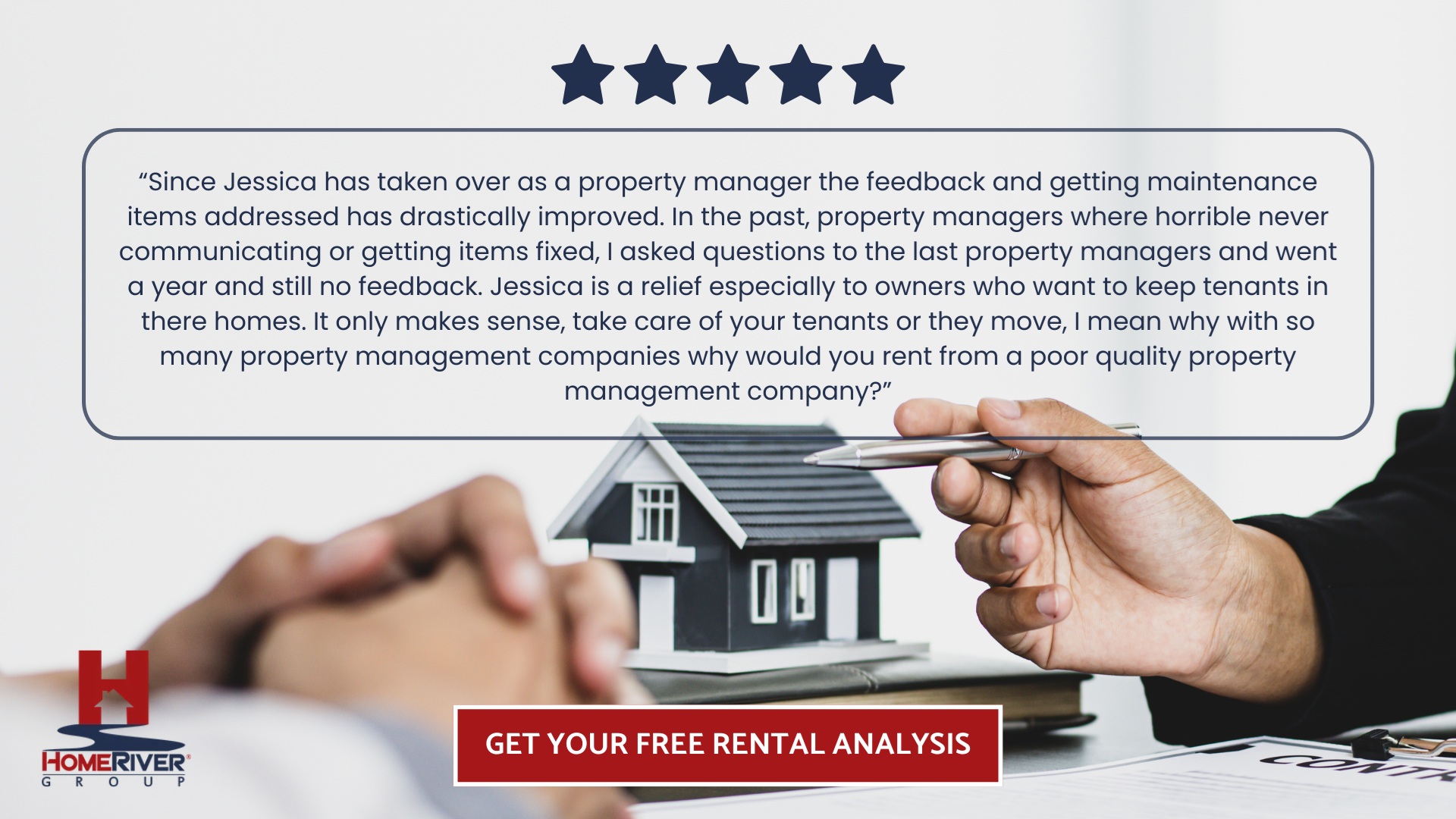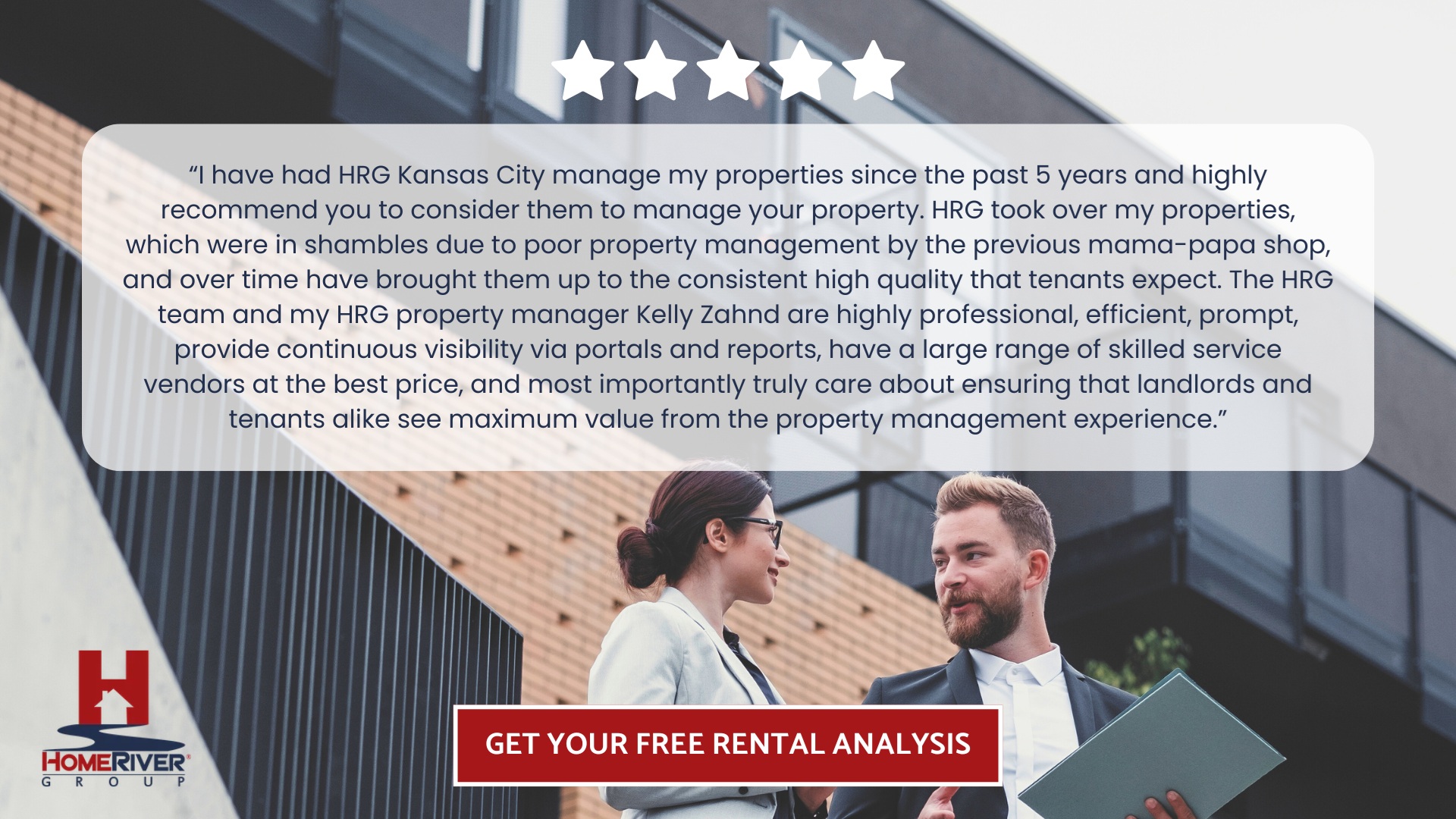
Understanding homeowners' insurance for rental property is critical for protecting investment and reducing financial risk. Standard homeowners' policies often fall short once a property is leased, leaving gaps in coverage. Landlord-specific policies can address damages, liability, and even lost rental income when tenants can’t occupy the home. For landlords, knowing which protections are essential and how they differ from typical policies ensures both compliance and peace of mind while managing valuable assets.
Managing more than 40,000 properties nationwide, we’ve built a reputation for efficiency and accountability at scale. At HomeRiver Group, our systems deliver accurate reporting, responsive maintenance, and consistent tenant satisfaction. Property owners rely on our expertise to reduce vacancy, strengthen compliance, and protect long-term value. With a blend of national strength and local insight, we provide landlords the stability and performance to grow portfolios confidently in an ever-changing rental market.
This blog will explore the essentials of homeowners' insurance for rental property, the differences between standard homeowners and landlord-specific policies, and the critical coverages every landlord should consider to safeguard income and long-term investment value.
What Makes Homeowners Insurance Different When The Property Is A Rental
Insuring a property as a rental fundamentally changes the protection it needs and the policy that covers it. Homeowners insurance is designed for properties where the owner lives on site. Once a property shifts to tenant occupancy, insurers classify it as a greater risk, and standard homeowners policies may not provide coverage for renting-related incidents.
Unique Risks Faced By Rental Properties
Rental properties face unique exposures. Rather than owners, tenants live in the home daily, which increases potential for accidental damage or liability claims. For instance, a renter could unintentionally cause a kitchen fire or fail to report a maintenance issue that turns into a costly repair. Standard homeowners' policies often exclude liability arising from tenant actions, leaving landlords exposed if a claim or lawsuit emerges.
Importance Of Protecting Rental Income
Moreover, rental properties require coverage for loss of rental income. A landlord policy can compensate for lost rent during repairs if the home becomes uninhabitable after a covered event, such as a fire or severe storm. This vital safeguard isn’t found in typical homeowners coverage.
Differences In Personal Property Coverage
There’s also a difference in personal property coverage. Homeowners insurance protects the owner’s belongings, but the tenant’s possessions aren’t covered when renting out a property. Landlord insurance focuses on the building, owner-installed appliances, and other property the owner leaves for the tenant’s use, including fixtures and tools stored on site.
Why Landlords Need Additional Liability Protection
Finally, additional liability protection is critical. Injuries or accidents involving tenants or their guests could lead to costly legal battles. Specialized landlord insurance policies are designed to address these risks, offering targeted liability and property damage coverage that aligns with the realities of managing a rental.
Core Protections Every Landlord Policy Should Include
Landlord insurance is designed to address the distinct challenges of renting out property. To properly safeguard your investment and minimize risk, it’s essential to ensure your policy covers these core protections:
Property Damage Coverage: At the heart of any landlord insurance policy is protection for the physical structure of your rental. This includes repairs or replacement following damage caused by fire, storm, vandalism, and certain types of water damage. Equally important is coverage for detached structures on the property, like garages or sheds.
Liability Protection: If a tenant or guest is injured on the rental property, liability coverage helps protect you against legal or medical expenses arising from such incidents. Whether a slip on an icy sidewalk or a trip on a broken step, liability coverage is crucial in shielding landlords from significant financial loss.
Loss Of Rental Income: When a property becomes uninhabitable due to covered damage, like a fire or a significant storm, loss of rental income coverage helps offset the revenue you’d otherwise lose during repairs. This ensures your cash flow remains stable even when unexpected events force tenants to vacate the premises.
Personal Property Protection (For Landlord-Owned Items): While tenants are responsible for insuring their personal property, landlord policies can cover items belonging to the property owner, such as appliances, lawn equipment, or furnishings provided with the rental. Protecting these assets is vital, especially for fully or partially furnished rentals.
Legal Fee Coverage: Rental property management isn’t immune to legal disputes. Landlord insurance can help with attorney costs, court filing fees, or settlements relating to evictions, damages, or lease violations, providing an extra layer of security when conflicts arise.
Checking that your policy includes these essentials means you’re prepared for most risks landlords face. Always review your coverage limits and exclusions to prevent any surprises when making a claim.
Insurance Requirements Set By Lenders And HOAs
When renting a property, landlords must navigate the layered requirements imposed by mortgage lenders and homeowners associations (HOAs). Both entities have a vested interest in protecting and preserving the property's value, and their expectations shape the scope and type of insurance coverage landlords must maintain.
Minimum Coverage Standards From Mortgage Lenders
Most lenders require landlords to carry an active homeowners' insurance policy on any mortgaged rental property. This policy must, at a minimum, cover the structure itself against perils such as fire, theft, and certain natural disasters. Some lenders may stipulate a specific liability coverage amount, ensuring the property remains protected throughout the loan term. Failure to comply with these insurance requirements can jeopardize your mortgage or result in force-placed insurance, which generally comes at a higher cost and offers less comprehensive coverage.
Additional Insurance Mandates From HOAs
Additional insurance mandates often apply to those whose properties fall within an HOA's jurisdiction. HOAs may institute rules around liability minimums, coverage for shared or common areas, and even specific carriers or types of policies. It's common for HOAs to outline coverage stipulations in their bylaws or covenants. These requirements are designed not only to protect individual units but also to ensure the financial well-being of the overall community.
Staying Proactive To Avoid Penalties
Landlords should thoroughly review lender agreements and HOA documents before finalizing any insurance policy. Overlooking these requirements can expose you to hefty penalties or leave you unintentionally underinsured. Staying proactive and informed is key to keeping your rental property compliant, secure, and ready for occupancy.
State And Local Regulation Changes Landlords Should Track
Staying ahead of state and local regulatory changes is essential for any landlord managing rental property. Insurance requirements and the broader framework of landlord-tenant law can shift quickly, placing new responsibilities and potential liabilities on property owners. Some states are introducing stricter guidelines regarding minimum insurance coverage for rental properties, while others are updating disclosure mandates and tenant protection rules.
How Municipal Rules Affect Insurance Coverage
For example, municipalities might impose requirements for specific types of liability insurance, or mandate that landlords provide proof of adequate homeowners' insurance for rental property before they approve new tenants. Recently, several cities have updated building codes and inspection schedules, influencing whether and how an insurer will continue to underwrite a property.
The Impact Of Legislative Updates On Coverage
Understanding the exact requirements in your property's location helps ensure compliance and avoid penalties. Legislative changes can also impact what your policy covers, or doesn’t. Some states are revising statutes on property damage, habitability standards, and even mandatory loss-of-rent coverage in disaster situations.
Where To Find Reliable Regulatory Updates
Following updates from state insurance departments, local housing authorities, and relevant professional associations is critical. Joining landlord groups and attending city council meetings can provide early warning about pending changes. Consult a local insurance expert who understands the intersection of real estate law and homeowners' insurance for rental property, especially if you own property in multiple jurisdictions. Staying proactive helps safeguard investments and ensures a compliant, well-protected rental operation.
Common Coverage Gaps And How To Close Them
When securing homeowners' insurance for rental property, it’s easy to overlook essential coverage gaps that could expose landlords. Understanding and proactively addressing these vulnerabilities can protect your investment and provide greater peace of mind.
Loss Of Rental Income: Standard policies typically don’t account for lost rental income when a property becomes uninhabitable due to a covered peril, such as fire or severe storm damage. Landlord-specific policies often include loss of rent coverage as an optional add-on, ensuring continued cash flow during repairs.
Liability Protections: Homeowners insurance may include some liability coverage, but it often falls short for rental properties. Enhanced landlord liability endorsements or umbrella policies can provide additional protection against legal claims stemming from tenant injuries, property damage, or allegations of negligence.
Tenant-Caused Damage: Many policies exclude damage caused intentionally or through gross negligence by tenants. Consider riders or supplemental coverage that account for tenant-caused losses—standard security deposits may not always bridge the gap.
Equipment & Appliance Coverage: Major systems, such as HVAC units and water heaters, might not be fully covered for mechanical breakdowns. Specialized equipment breakdown insurance can offset repairing or replacing these essential items.
Short-Term Rentals: If you’re renting to guests on a short-term basis, traditional landlord policies might not cover issues that arise from transient occupancy. Investigate specialty insurance for short-term or vacation rentals to eliminate this blind spot.
By identifying and addressing these common gaps, landlords can tailor their policy to ensure comprehensive protection tailored to the unique risks rental properties present.
Final Thoughts
Navigating homeowners' insurance for rental property is essential to responsible property management. Understanding the limitations of standard homeowners policies and the importance of specialized landlord insurance puts property owners in a strong position to safeguard their investments. Coverage options for losses due to property damage, liability, and loss of rental income ensure your business is protected against common risks.
At HomeRiver Group, we’ve seen firsthand the difference that informed insurance decisions can make for landlords. Every property, neighborhood, and market presents unique risks. That’s why partnering with specialists who combine national resources with local expertise is crucial to protecting your assets. Don’t leave your rental exposed to unnecessary risk; review your current policy, consult professionals, and update your coverage as your portfolio grows or regulations change.
By leveraging our unified national platform and deep local insight, we help rental property owners make decisions that support both day-to-day and long-term success. Whether you’re managing a single unit or exploring opportunities like how to buy a second home and rent the first, your property is our priority.
Read Also:
Frequently Asked Questions About Homeowners Insurance For Rental Property
How is landlord insurance different from homeowners' insurance?
Landlord insurance is specifically designed for property owners who rent out their homes or investment properties. While standard homeowners insurance primarily covers owner-occupied residences, landlord insurance includes coverage tailored for rental risks—such as loss of rental income, property damage caused by tenants, and additional liability protection.
Do I need special insurance if I rent out my home?
Yes, if you decide to rent out your home, you should switch from a standard homeowners insurance policy to a landlord insurance policy. Conventional homeowners' insurance may not cover claims that arise while your property is being rented; landlord insurance ensures you’re protected as a property owner with tenants.
What does rental property insurance typically cover?
Rental property insurance generally covers the structure itself, liability protection in case of tenant or guest injuries, and loss of rental income if your property becomes uninhabitable due to a covered loss. Additional options can include appliance coverage, furnishings, and other landlord-owned assets.
Does homeowners' insurance cover short-term rentals like Airbnb?
Most homeowners' insurance policies do not cover short-term or vacation rental activity, such as listing your property on Airbnb or VRBO. If you plan to rent your property for short-term stays, you’ll need to purchase either a specific rider to your policy or short-term rental insurance to fill in coverage gaps.
What liability coverage do I need as a landlord?
As a landlord, robust liability coverage is essential to protect against potential lawsuits resulting from tenant or guest injuries on your property. Many landlord insurance policies include liability protection; you can purchase additional coverage, such as umbrella insurance, to further safeguard your assets.
Does landlord insurance cover loss of rental income?
Most landlord insurance policies include optional coverage for loss of rental income, which reimburses you if your property becomes uninhabitable due to a covered event (like a fire or major storm). It’s essential to check with your insurer and ensure this feature is included in your specific policy.
Do I need to notify my insurer if I start renting out my home?
Absolutely. If you begin renting out your home, you must inform your insurance provider immediately. Failing to disclose this change in occupancy can lead to denied claims or cancellation of your existing policy. Your insurer will help you transition to the appropriate coverage for your rental situation.
Does my insurance cover my tenants’ belongings?
No, landlord insurance does not cover tenants’ personal belongings. Renters should obtain their own renters' insurance policy to protect their possessions and provide additional liability protection. As a property manager, HomeRiver Group always recommends that tenants secure adequate renters' insurance for their safety and yours.











